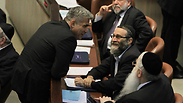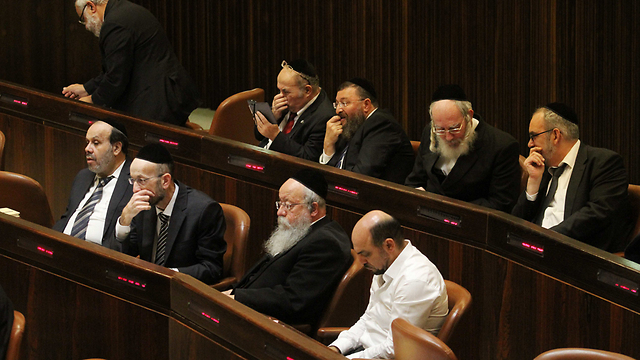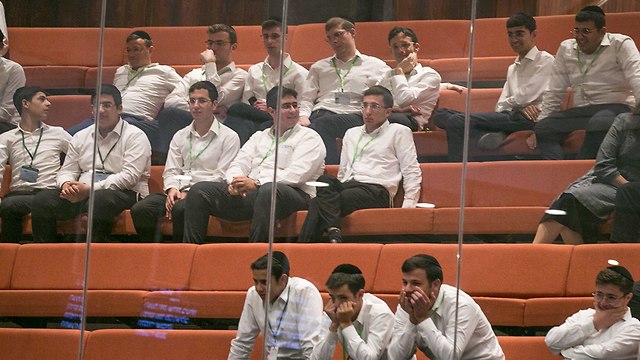
A chance to change the political status quo
Opinion: Over-representation of religious sector in the next Knesset could be a national blessing if the religious-Zionists could form a unified block to counter the ultra-Orthodox on the matters of religion and state
There is nothing new in the fact that the Haredi and religious political parties - United Torah Judaism, Shas and Union of Right-Wing Parties - are expected to get at least 20 seats in the Knesset. What’s interesting is the number of religious MKs who are going to be elected to parliament through the non-organized religious politics. For instance, Knesset Speaker Yuli Edelstein (who came in first place in the Likud primary) as well as religious members of the Blue and White party, the New Right, the Labor Party and Moshe Feiglin's Zehut, are all expected to be part of the Knesset after the April 9 vote.
It looks as though some one-third of the MKs in the next Knesset will be religious or ultra-Orthodox. If that’s the case, should we fear the next parliament will have proclivity to be more religious, or is there an opportunity for a positive turnaround?
Despite the inflation of religious representation in the next Knesset, the parliament will not transform into a natural habitat for religious Zionists from the mainstream. The National Haredi (known as Chardali) have taken control of the Jewish Home Party - Chairman Rabbi Peri Peretz and its MK Bezalel Smotrich - are different variations of essentially the same thing, and their merger with the far-right Otzma Yehudit (Jewish Power) party has created a lethal combination. A bitter pill that is hard to swallow for many.
Religious liberals have a long time ago crossed their equivalent of the Rubicon, and see no need to vote for any party on the right, center or (sparingly) the left. But the Chardali and the religious liberals are relatively small groups. The majority of the religious population, the core group that comprises more than half of religious Zionism, remains without an organized political home.
Although this is technically a new reality, it could’ve been predicted beforehand. The Haredi and the Chardali (like the Arabs) strive to isolate themselves and maintain their identity separate from the general population. Thus, they are in need of political representation.
The religious Zionists, however, aspire to integrate into society and are doing so quite successfully in all areas of life: military, high-tech, media, law, academia, and art. Therefore, it’s natural that the integration process will spillover into politics.
Ze'ev Elkin (Likud), Elazar Stern (Yesh Atid), Revital Swid (the Labor Party) and Moshe Feiglin are divided on many issues, but they defined themselves - from the beginning - as part of the general Israeli society. They maintain a unique character of their lifestyle and their beliefs, while simultaneously integrating into political institutions.
The fact that the number of religious MKs, integrated into general political institutions is almost equal to the number of religious parties striving to isolate themselves, creates an opportunity.
Most of those who have integrated oppose the status quo related to matters of religion and state, and turn a blind eye on the damage caused to the Jewish identity in the public sphere. Will they be able, as a group, to influence the issues of religion and state, despite the differences of opinion they have on other issues?
It’s highly doubtful whether the process to change the status quo is ready to be kickstarted, since the Haredi will continue to preserve themselves as a veto player - the one who can stop a change from the status quo - in the political arena.
Nevertheless, the issue of changing the status quo might be placed on the agenda as soon as the next government is formed. A cross-party lobby should be established, led by religious and traditionalists, which would counter the power of the religious conservatives on issues relating to religion and state. This campaign to abolish religious coercion should be led by MKs who observe the mitzvot (the commandments of the Torah), so there could be no dispute over their commitment to their faith or their dedication to cultivating a public sphere in Israel in a way that would emphasize the country’s Jewish identity.
We are familiar with the outlines of arrangements regarding the matters relating to religion and state. Many leading Knesset members - including Prime Minister Benjamin Netanyahu, Avi Gabbay, Naftali Bennett, Moshe Kahlon and others - would have signed these arrangements if not for the threats of extremists on both sides: the political power of the Haredi and Chardali on the one hand, and the extreme rhetoric of the left-wing that seeks to separate completely the issues of religion and state on the other.
The religious politicians who are willing to integrate should also be willing enlist in a mission to reconcile the Israeli society on issues concerning religion and state. If it does indeed happen, it would become clear that the expected over-representation of the religious sector in the next Knesset is not a threat but rather a national blessing.












